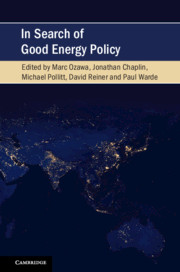Book contents
- In Search of Good Energy Policy
- In Search of Good Energy Policy
- Copyright page
- Contents
- Figures
- Tables
- Contributors
- Acknowledgments
- 1 Introduction
- Part I Multidisciplinary Perspectives
- 2 Political Science and Energy
- 3 Economics – The Proper Valuation of Security and Environment
- 4 Good Energy: Philosophical Perspectives
- 5 Public Theology – ‘Grounded’: An Energy Policy Rooted in Human Flourishing
- 6 Anthropology and Energy Policy
- 7 History: A Long View?
- 8 Management – From the Drawing Board to Successful Delivery
- 9 Legal Aspects of Energy Policy
- Part II Cases and Multidisciplinary Responses
- Part III Multidisciplinary Cases
- Index
7 - History: A Long View?
from Part I - Multidisciplinary Perspectives
Published online by Cambridge University Press: 10 June 2019
- In Search of Good Energy Policy
- In Search of Good Energy Policy
- Copyright page
- Contents
- Figures
- Tables
- Contributors
- Acknowledgments
- 1 Introduction
- Part I Multidisciplinary Perspectives
- 2 Political Science and Energy
- 3 Economics – The Proper Valuation of Security and Environment
- 4 Good Energy: Philosophical Perspectives
- 5 Public Theology – ‘Grounded’: An Energy Policy Rooted in Human Flourishing
- 6 Anthropology and Energy Policy
- 7 History: A Long View?
- 8 Management – From the Drawing Board to Successful Delivery
- 9 Legal Aspects of Energy Policy
- Part II Cases and Multidisciplinary Responses
- Part III Multidisciplinary Cases
- Index
Summary
This chapter examines the uses of academic approaches to history in discussing energy policy. It sets out a case that the value of history is not simply in the past as a source of empirical data on policy and behaviour (which is accessible to any discipline), but a style of synthetic thinking and evaluation particular to the study of History as a disciplines. History may provide analogue situations for current dilemmas, and a long-term view on change, but does not necessarily work in large-scale or long-term phenomena. Rather, it is the blending of perspectives and the assumption of causal complexity, as opposed to methodological and explanatory parsimony, that marks the value of historical approaches. This is exemplified in the history of prediction, asking not whether predictions were accurate (generally they were not), but why demand for them arose and how they were constructed so as to be plausible to actors.
- Type
- Chapter
- Information
- In Search of Good Energy Policy , pp. 76 - 81Publisher: Cambridge University PressPrint publication year: 2019

